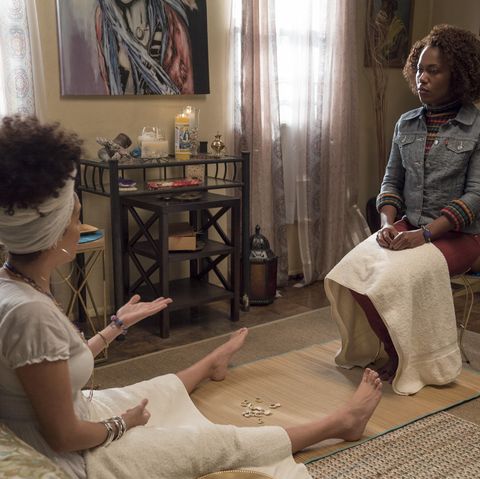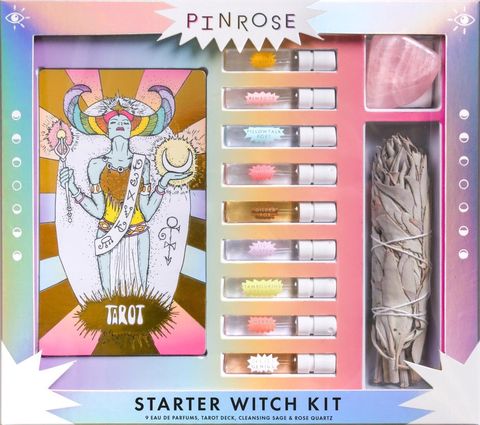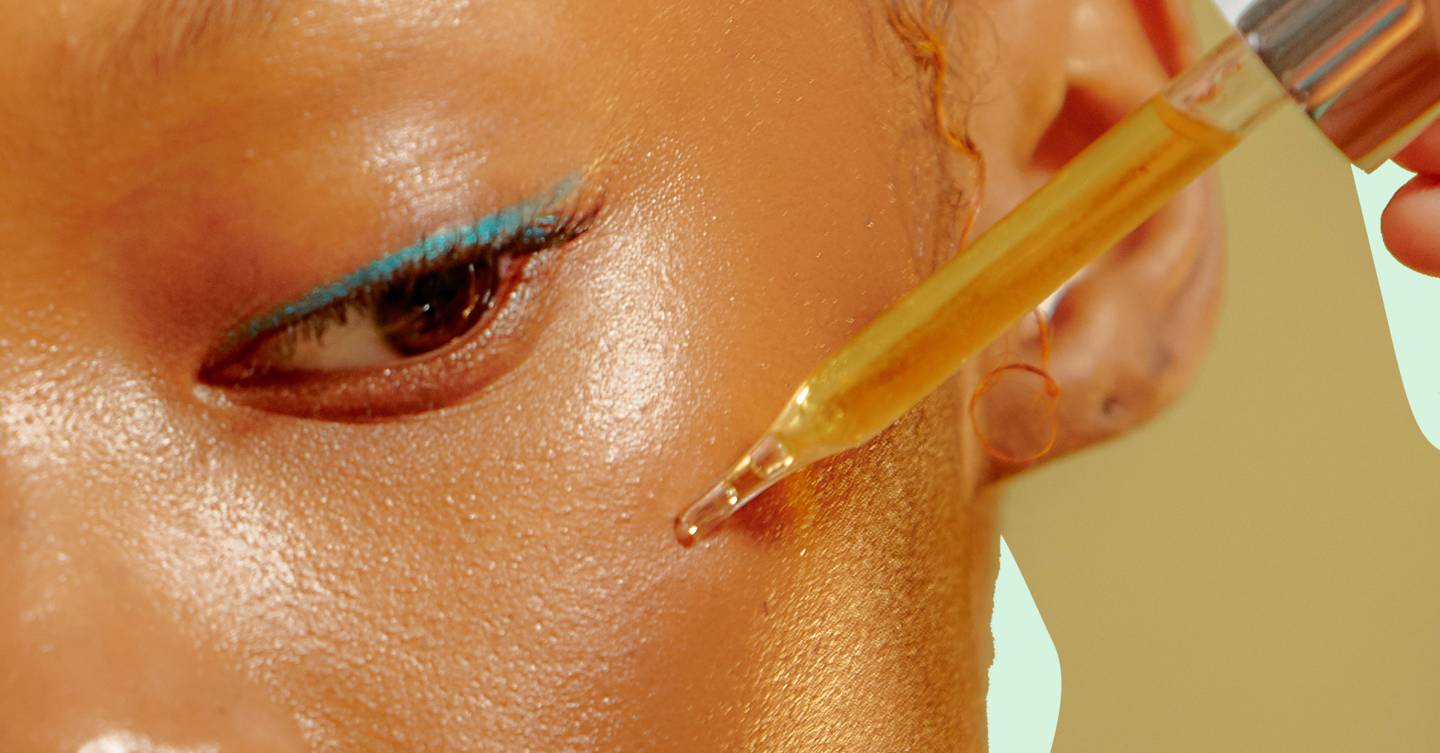When Nola Darling, the main character in Spike Lee’s Netflix comedy-drama She’s Gotta Have It, is assaulted in a season one episode, her Afro-Puerto Rican lover Mars Blackmon suggests she sit with his sister for a cleansing. A santera known as Lourdes (Lulu for short) can remove Nola’s “negative ions and energies,” as Mars describes them.
Toward the end of the season, Nola finally seeks a consulta (consultation) with Lulu in her Brooklyn projects apartment. “Let’s see what Elegua has for Ms. Nola,” Lulu says as she channels the deity, or orisha, known to hold the answers to all questions. Behind Lulu is a display of spiritual tools: Lit candles, water, and cowry shells, with a backdrop symbolic of Yemaya, a Yoruba orisha, the ”goddess of the sea.”
African spiritual traditions have permeated pop culture over the last several years, from scenes like this one in She’s Gotta Have It to the Charmed reboot (the three half-sisters are Latina, two of whom identify as Afro-Caribbean and African American) and the Netflix series Siempre Bruja about a time-traveling Afro-Colombian witch. Earlier this year, Beyoncé made references to orishas like Oshun and Yemayá is her song “Black Parade,” to whom she’s also paid tribute in her visual albums Lemonade and Black Is King.
She’s Gotta Have It’s Lulu was portrayed by Santana Caress Benitez, 33, a real life Lucumí practitioner who has been practicing for seven years. For her, this was more than an acting role; it was a representation of her values. “I was very clear. I was like, “Listen, I practice my religion; this is real life for me,” the Afro-Boricua actress and chef says of filming the show.
Lucumí—which is also known as Yoruba, Santería, Regla de Ocha, or La Regla de Ifá—is a spiritual belief system that stems from West Africa. Today, it’s commonly found in Cuba, as well as other areas like Puerto Rico and mainland U.S. The Yoruba people, one of the largest ethnic groups to originate from West Africa (specifically Benin, Togo and southwestern Nigeria) existed and maintained their traditions before colonial powers arrived on the continent.
Existing for more than 10,000 years, the Yoruba faith, which centers on orisha worship and ancestor veneration, outlived the brutality of the transatlantic slave trade. Their unshakable faith was a source of strength and resilience. Of the 11.2 million Africans that survived the forced journey between 1502 and 1866, 450,000 arrived in the United States; the rest were taken to the Caribbean, Central, and South America. But their spiritual practices remained, spreading across the African Diaspora—and they’re seeing a resurgence today.
Brujería, which refers to various spiritual practices that have been used by African, Caribbean, and Indigenous Latin American populations, is having a visible resurgence among millennial Afro-descendants from Latin Americans here in the States, both on-and-off screen. Whether Afro-descendants grew up with African-inspired spiritual traditions centered or hidden behind Christian faiths, these forms of spirituality have recently come to the forefront among Afro-Latinas as a reclamation of their ancestral practices. Scroll through Instagram and search #bruja, the Spanish term for witch, and you’ll find over one million posts.
“Being Afro-Latina, being first generation Dominican-American, and having parents who haven’t fully cut themselves off from their homeland has such a huge impact on us,” says Suhaly Bautista-Carolina, the 34-year-old founder of Moon Mother Apothecary, of millennial Afro-Latinas. “Now, we find ourselves returning to our ancestors and to our heritage.”
For author and activist Yvette Modestin, who was born and raised Catholic in Colón, Panama, Ifá and the grounding, healing and cleansing practices that come with it are a way of life. It’s one reason she sees millennials reconnecting with African spiritual traditions, even as there’s a steady decline in traditional forms of religion among Latinx millennials.
“When you get to a place of understanding that everything you are is seen as a negative, you’ve got to reach for something else to keep you getting out of your bed, to keep you moving, to keep you walking, to keep you singing, to keep you dancing,” says Modestin. She starts each day by kneeling before her altar, asking for guidance.
“I think part of that is reaching for something that is grounding, that is uplifting, that is cleansing, that is healing—and that comes with leaning into spiritual practices.”
This content is imported from Instagram. You may be able to find the same content in another format, or you may be able to find more information, at their web site.
Today, there are numerous African-derived religions thriving around the world: Candomblé and Umbanda, practiced mainly in Brazil; Voodoo, found primarily in Louisiana and the southeastern U.S.; Haitian Vodou, Dominican Vudú, or Las 21 Divisiones (21 Divisions); West African Vodoun, and Black American folk spirituality known as Hoodoo, among others.
Yoruba’s imprint is found across each of these religious traditions. However, there are unique aspects that have shaped each. Candomblé and Umbanda, for instance, refer to deities as orixás, while Voodoo, Vodoun, Vodou, and Vudú reference them as loa, lwa, and los loases, or misterios, respectively. Practitioners and high priests or priestesses in each religion undergo a specific initiation process. Though certain portions of each process are now Googlable in 2020, many aspects are undisclosed in reverence to the religion.
Dr. Marta Moreno Vega, a Yoruba priestess and founder of the Caribbean Cultural Center African Diaspora Institute, describes these ancestral traditions as affirmations for the Afro-descendant community. Though organized religion tried to forcibly remove said traditions, the fact that they have remained until today speaks volumes.
“It has a historical legacy in our communities, because for the enslaved Africans that were brought from West and Central Africa, the spiritual practices and traditions were interwoven with spirit, as well as principles for living and functioning everyday,” says Moreno Vega. “We see that throughout Latin America, the Caribbean, throughout the Southern United States. Now people have brought their traditions to urban areas.”
Afro-Dominican identical twins Dr. Griselda Rodriguez-Solomon and Dr. Miguelina Rodriguez, the founders of Brujas of Brooklyn, are invested in creating a place for women to share, grow, and release within the bustle of city life. “We’re very much about creating space for women of African descent to find a place of solace and healing,” shares Rodriguez-Solomon, a doula and yogi.
During their “Woke Womb Work” workshops, the Rodriguez sisters use their magic to heal the womb, where most women store trauma. Their workshops vary and can last up to two hours and host anywhere from 25 to over 100 people. They often include modalities like Kundalini Yoga, breathing and chanting, sweat and, yes, twerking. The movement shifts stagnant energy and different parts of a participant’s aura.
According to the sisters, this work is especially vital for Black women in America who are three to four times as likely to die from pregnancy-related causes than white women.
“Each of us has that magic inside, and it’s about how you can create magic on a practical, day-to-day level,” says Rodriguez. “The practicalness of brujeria is what we’re trying to show.”
History shows that in times of resistance and the steadfast fight for liberation, as noted with Vodou’s role in the Haitian Revolution, spirituality has protected and given Afro-descendants the undefinable strength to move toward victory. More recently, the police killings of George Floyd, Breonna Taylor and Tony McDade, among others, have unleashed a wave of protests across the globe in support of Black Lives Matter.
Everything from the call-and-response chants to protestors calling out the names of those lost—a form of ancestor veneration—nod to spiritual elements that now exist within the movement.
Modestin, who also works as the Diaspora Coordinator of Red De Mujeres Afrolatinoamericanas, Afrocaribeñas y de la Diaspora, explains: “When we say their names, it’s because we’re asking for the spirits of Ahmaud, and Breonna, and George, because we need their spirits to continue to guide us to finish and do what we gotta do for them to have their name not be in vain.”
At the time of our interview, Rodriguez has a cold. She puts ingredients aside for a homeopathic remedy, which includes a tea made of ginger, apple, cinnamon, red onion, lime, and a dash of cayenne pepper, oregano oil, and Vicks VapoRub.
Both women, 39, were introduced to the power of healing early in life when their godmother, Negra, would prepare homemade juices and dandelion tea for their mother. “We would be in the ‘hood, Bed-Stuy 1990, crack era,” she says. “It’s not the fly Stuyvesant Heights that it is today, but it was home to us nonetheless. And we would be picking dandelions and we would come with bags full, and she would wash it and make my mother tea.”
This content is imported from Instagram. You may be able to find the same content in another format, or you may be able to find more information, at their web site.
Dandelion has a number of health benefits, including boosting the immune system, improving digestion, preventing the growth of cancer, and detoxing the liver. “Of course, my godmother didn’t have the vocabulary, but her knowledge was genetic. She had it in her DNA,” says Rodriguez-Solomon. “The fact that she could spot an herb in the middle of an urban setting and know that it was healing and it wasn’t poisonous was very magical.”
While insight like this has been passed down generationally through biological and chosen families, the entry point for some might be different now—thanks to the openness of social media. It’s there that many new communities have been built and sustained around these spiritual practices. Spiritualists like Tatianna Morales, a New Orleans-based tarot reader and Iyanifa who goes by Tatianna Tarot; Bri Luna, owner and creator of The Hoodwitch; and Jessyka Winston, Haus of Hoodoo founder, have become sought-after practitioners who share their specialized knowledge with hundreds of thousands of followers.
For practitioners, social media has been a double-edged sword. “I definitely know more people in the community because of social media, and that has been very special,” Bautista-Carolina says. “But I’ve also seen inauthentic things like appropriation.”
Noticing spiritualism’s popularity, corporations have tapped into the lucrative, highly-marketable wellness space, which boasts $3.7 trillion, according to the Global Wellness Institute. Sephora received backlash after announcing in September 2018 it would offer a nine-piece “Starter Witch Kit” in stores and online, including fragrances as well as tarot cards, sage, and a rose quartz crystal. The move left many in the community upset..
Speaking to the hosts of the podcast Morado Lens, Haus of Hoodoo’s Winston addressed companies cashing in on spirituality. “I believe that selling something sacred without proper information is a problem,” the Vodou priestess said. “I get it, you’re trying to be with the trends—but you don’t understand this is not a trend. Those items belong in spiritual shops where a knowledgeable person can sell that product to someone who needs it.”
Benitez similarly cautions people from treating spirituality as a trend. With greater visibility, it’s quite common these days to see people on social media liken themselves to one of the widely referenced orishas like Oshun, the goddess of fresh waters, sensuality and beauty, or Shango, the god of thunder and lighting, as well as masculinity. (There are more than 400 orishas.)
“Stop saying that you’re this or that because you feel beautiful and you like money,” she asserts. “You’re not Oshun because you’re beautiful. You’re not a Shango because you’re a man who likes to party. You’re not necessarily Yemayá because you’re a mothering type. You can know who you are like when you start to get an actual sense of what you’re practicing.”
Benitez wrapped season 2 of She’s Gotta Have It in 2018, which brought the production to Puerto Rico. After, she decided to stay, relocating to the island to actively live her altar. “I can go to the river and give offerings to Oshun. I can go to a Ceiba tree and get a plant for Shango. To live in nature makes the Osha more powerful.”
She advises anyone with an interest in these spiritual practices to begin with research and ask questions. Before seeking initiation, explore readings or spiritual consultations from practitioners. Like any journey, there are different paths, and while it can look like a straight shot from the outside, those who are practitioners know there’s more to it. And with anything, especially spirituality and wellness, it’s always important to reflect on your why.
For more stories like this, sign up for our newsletter.
This content is created and maintained by a third party, and imported onto this page to help users provide their email addresses. You may be able to find more information about this and similar content at piano.io



